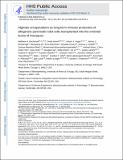Alginate encapsulation as long-term immune protection of allogeneic pancreatic islet cells transplanted into the omental bursa of macaques
Author(s)
Bochenek, Matthew A.; Veiseh, Omid; Vegas, Arturo; McGarrigle, James J.; Qi, Meirigeng; Marchese, Enza; Omami, Mustafa; Doloff, Joshua C; Mendoza-Elias, Joshua; Nourmohammadzadeh, Mohammad; Khan, Arshad; Yeh, Chun-Chieh; Xing, Yuan; Isa, Douglas; Ghani, Sofia; Li, Jie; Landry, Casey E.; Bader, Andrew; Olejnik, Karsten; Chen, Michael Y; Hollister-Lock, Jennifer; Wang, Yong; Greiner, Dale L.; Weir, Gordon C.; Strand, Berit Løkensgard; Rokstad, Anne Mari A.; Lacik, Igor; Langer, Robert S; Anderson, Daniel G.; Oberholzer, Jose; Anderson, Daniel Griffith; ... Show more Show less
DownloadAccepted version (936.3Kb)
Terms of use
Metadata
Show full item recordAbstract
The transplantation of pancreatic islet cells could restore glycaemic control in patients with type 1 diabetes. Microspheres for islet encapsulation have enabled long-term glycaemic control in rodent models of diabetes; however, humans transplanted with equivalent microsphere formulations have experienced only transient islet graft function owing to a vigorous foreign-body response (FBR), to pericapsular fibrotic overgrowth (PFO) and, in upright bipedal species, to the sedimentation of the microspheres within the peritoneal cavity. Here, we report the results of the testing in non-human primate (NHP) models of seven alginate formulations that were efficacious in rodents, including three that led to transient islet graft function in clinical trials. All formulations elicited significant FBR and PFO 1 month post implantation; however, three chemically modified, immune-modulating alginate formulations elicited a reduced FBR. In conjunction with a minimally invasive transplantation technique into the bursa omentalis of NHPs, the most promising chemically modified alginate derivative (Z1-Y15) protected viable and glucose-responsive allogeneic islets for 4 months without the need for immunosuppression. Chemically modified alginate formulations may enable the long-term transplantation of islets for the correction of insulin deficiency.
Date issued
2018-08Department
Massachusetts Institute of Technology. Department of Chemical Engineering; Massachusetts Institute of Technology. Institute for Medical Engineering & Science; Harvard University--MIT Division of Health Sciences and Technology; Massachusetts Institute of Technology. Department of Biological Engineering; Koch Institute for Integrative Cancer Research at MITJournal
Nature Biomedical Engineering
Publisher
Springer Nature
Citation
Bochenek, Matthew A. et al. "Alginate encapsulation as long-term immune protection of allogeneic pancreatic islet cells transplanted into the omental bursa of macaques." Nature Biomedical Engineering 2, 11 (August 2018): 810-821 © 2018 The Author(s)
Version: Author's final manuscript
ISSN
2157-846X